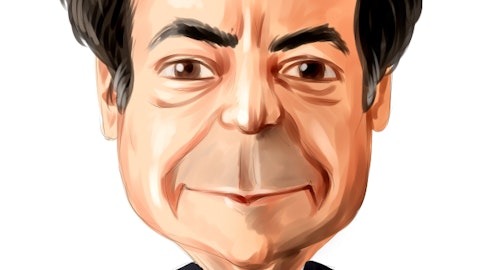Jeffrey Altman founded Owl Creek Asset Management in June 2001. Before that, Altman was a portfolio manager at Franklin Mutual Advisers, LLC, specializing in distressed securities. Altman used this experience to form the basis for Owl Creek’s investment strategy, which BusinessWeek described as “a distressed equity strategy along with a capital structure arbitrage strategy as a hedging technique.” In other words, Owl Creek’s portfolio is filled with big name performers alongside troubled companies that will likely be sold or acquired at some point. Owl Creek Asset Management was down roughly 13% through the end of November.

On February 14, Owl Creek Asset Management filed its 13F for the fourth quarter 2011. It reported 34 positions with a collective value of $2.88 billion. The largest of these was a $342.38 million or 8.15 million share position in Cigna Corp (CI). The size of Owl Creek’s stake in Cigna increased sizably from the end of the third quarter, when Altman had just under 7.3 million shares in the company, valued at $306.05 million. Cigna, which is also a favorite pick for Andreas Halvorsen’s Viking Global, was trading at $44.93 a share when the markets closed on February 17. Analysts expect great things for the company, giving it a mean one-year target estimate of $54.07 and an earnings growth estimate of 10.25% per annum on average over the next five years – and we have to agree.
In addition to the upside, Cigna offers a small dividend of 4 cents (0.10% yield). The company also has low risk, with a beta of just 0.83, and is priced at just 7.37 times its forward earnings. Cigna also shines when compared to its rivals. A competitor like Aetna (AET), which has a similar market cap ($17.18B vs. Cigna’s $12.06B), just doesn’t have the upside – the stock closed at $47.50 with a mean target of $53.36 – it is riskier, with a beta of 1.1, and it is priced higher relative to its future earnings, with a forward P/E of 8.39. Granted, Aetna pays a higher dividend, at 70 cents a share (yield 1.50%), and has a higher earnings growth estimate at 12.05% but we don’t think these differences are worth the risk. We like Cigna.
Jeffrey Altman also owned a large stake in Navistar International (NAV) at the end of the fourth quarter, worth $231.19 million or 6.10 million shares. The holding was marginally larger than the 6.09 million shares Owl Creek owned in the company at the end of the third quarter, which had been valued at $195.86 million at the end of September. Navistar closed trading on February 17 at $44.53 and has a mean one-year target estimate of $57.57. It is priced low at 6.39 times its forward earnings and has an earnings growth estimate of 14.92% per annum on average over the next five years.
In comparison to rival PACCAR (PCAR), Navistar has a smaller market cap ($3.06B to PACCAR’s $15.43B), but Navistar is less risky (beta of 1.41 compared to PACCAR’s 1.51) and is priced lower (PACCAR has a forward P/E of 11.69). PACCAR does pay a decent dividend at 72 cents (1.60%) but it isn’t enough to make up for the lack of upside. We think Navistar is a great investment. Analysts expect the company’s earnings will increase by an average of 14.92% per annum over the next five years, whereas the S&P 500 is expected to increase by just 10.59% and rival PCAR’s earnings are expected to increase by just 12.00%. Carl Icahn’s Icahn Capital is also a fan. It owns roughly 10% of the company, as well as 10% of another Navistar rival, OshKosh (OSK). Icahn has said he support a merger between the two companies, explaining that this type of synergy driven consolidation will be one of the primary methods defense contractors drive earnings and reduce costs in the coming years.
Teva Pharmaceutical Industries (TEVA) was a significant holding for Owl Creek at the end of the fourth quarter, at $206.56 million or 5.12 million shares. This represents a strong increase from the end of the third quarter, when Owl Creek owned 4.86 million shares in Teva, worth roughly $180.96 million. Teva, which is a favorite pick for Boykin Curry’s Eagle Capital Management, closed trading on February 17 at $44.65 a share, on a one-year target estimate of $53.50. Barclays gave its an equal weight rating on December 9, but we see good things for Teva.
In addition to its upside, Teva pays a 69 cents dividend (1.50% yield) and it is priced low at just 7.44 times its forward earnings. Analysts estimates Teva’s earnings will grow by a rate of 8.04% per annum on average over the next five years. Looking at its competitors, we can see the draw to Teva. Its closest rival by market cap is Gilead Sciences (GILD) – Teva has a $40.44B market cap while Gilead has a $40.87B market cap. Gilead does not have anywhere near the upside – it closed at $47.00 on a one-year target estimate of $58.83. Gilead does have a stronger earnings growth estimate, at 15.22% per annum on average over the next five years, but it doesn’t pay a dividend and it is priced higher relative to its future earnings, with a forward P/E of 10.73, making Teva a clear winner.
Jeffrey Altman’s Owl Creek Asset Management also owned significant stakes in WellPoint (WLP), News Corp (NWSA), JP Morgan Chase (JPM) and Hewlett Packard (HPQ) at the end of the fourth quarter. Owl Creek Asset Management made a few bold moves, like selling out of its position in Apple (AAPL) which had been its third largest position at the end of the third quarter. The fund had had 609,764 shares in the company at the end of September, or $232.53 million.




